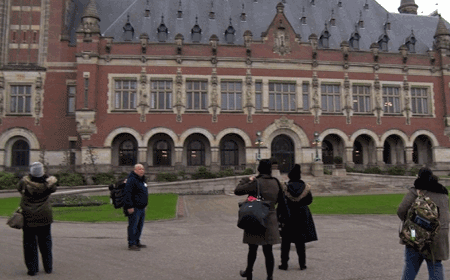The Hague – November 28, 201– The general or liberal nature of the definition of the Belize-Guatemala territorial dispute in the December 2008 Special Agreement or Compromis to take the case to the International Court of Justice (ICJ), has been the subject of criticism since its signing.
According to Article 40, paragraph 1 of the Statute of the Court, a special agreement often negotiated for years, must indicate “the subject of the dispute and the parties.” Additionally, the Rules of the Court at Article 39 (2) state that the notification accompanying the Special Agreement will indicate “the precise subject of the dispute and identify the parties to it” if that is not already apparent in the Special Agreement.
The Belize-Guatemala Special Agreement at Article 2 cites the parties seeking the ICJ’s determination of “any and all legal claims of Guatemala against Belize to land and insular territories and to any maritime areas pertaining to these territories, to declare the rights therein of both Parties, and to determine the boundaries between their respective territories and areas.”
Several international law experts have made a pronouncement on the issue. Among them is John R. Crook, an international arbitrator at the George Washington University Law School. In a 2009 article titled “Introductory Note to the Special Agreement Between Belize and Guatemala” he references the lack of precision in defining the geographical scope of the dispute with Guatemala, left free to frame all aspects of its claims in its own terms. He writes: “According to one report, Guatemala’s negotiators anticipate that Guatemala will claim the Southern portion of Belize between the Sibun and Sarstoon rivers, as well as all of the offshore cayes (except for St. George’s Caye, off Belize City.) However, the Compromis seems to leave latitude for Guatemala to reassert a claim it has made in the past – to all of Belize.”
In a 2016 article (“The Need for Precision in Formulating Disputes Brought to the International Court of Justice by Special Agreement”) published in the Heidelberg Journal of International Law by Roberto Lavalle, he is even more forceful on the issue. Referring to Article 2 of the Compromis he states, “This formulation is most anomalous: In addition to not even indicating how many Guatemalan claims there are and their nature, on a literal interpretation the formulation would, as observed by a Guatemalan author, allow Guatemala to claim the whole of the territory of Belize, whether continental, insular or maritime, thus effecting a legal destruction of Belize. From the observations that have been made above, it should be clear that, given its extreme generality, or vagueness, the formulation in question might well bring the parties into serious difficulties before the Court.”
By its very nature, a special agreement implies that because the document was negotiated, both must have consented to the extent of the claim. So why did Belize not insist on Guatemala delimiting its age-old claim ab initio (from the beginning)? This week in the Netherlands, Belize’s Non-resident Ambassador to The Hague, H.E. Dylan Vernon told Belizean journalists on a US Embassy-sponsored tour to the ICJ that “the question was very, very carefully defined, especially by the Belize side to include all claims that Guatemala might have.” The reasoning, according to Vernon, is to be done once and for all with ALL claims Guatemala may have against Belize so it cannot bring up anything else in the future. He added that Guatemala is the claimant and therefore it should be the one to define the dispute.
With that position it is doubtful that the Belize-Guatemala Special Agreement would be amended in the event that the case is taken to the ICJ.
Two professors of international law whom the media spoke with at The Hague and one ICJ official said the specifics can be defined at the stage of legal submissions.



